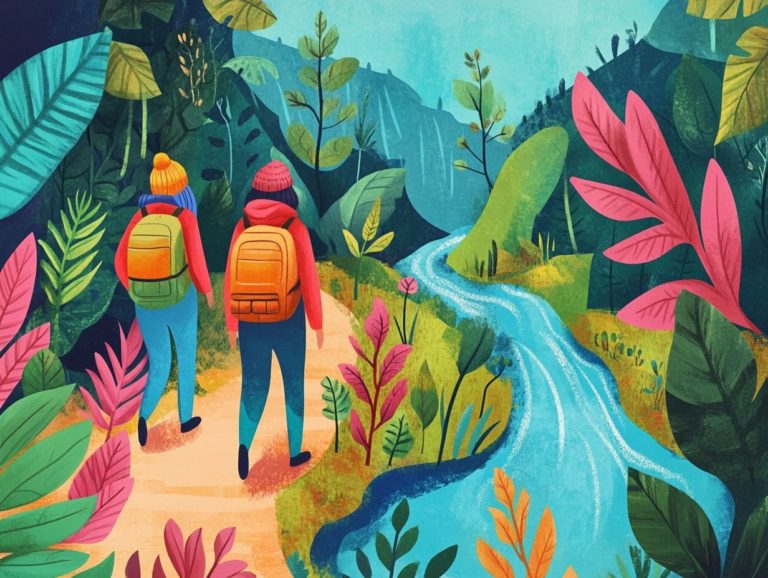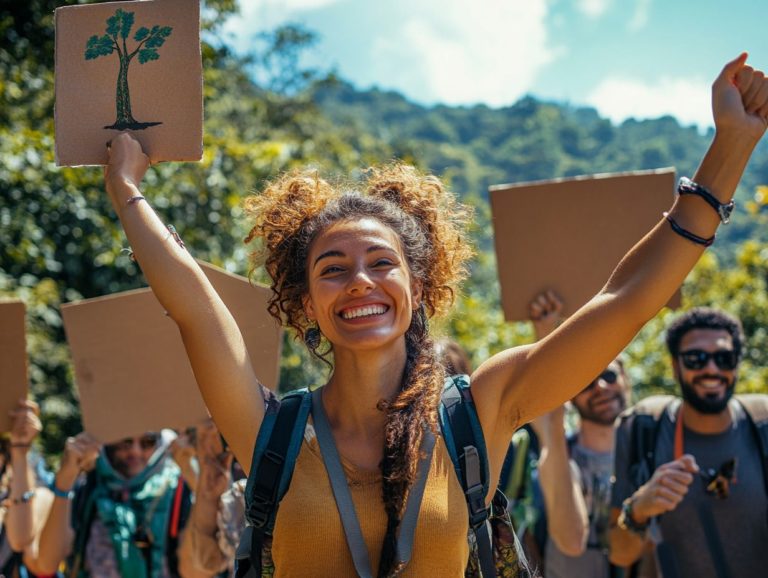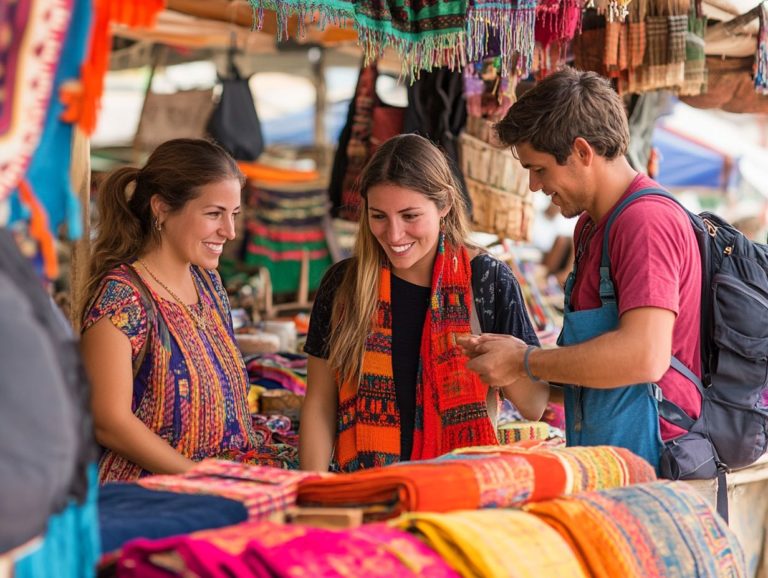Navigating Local Laws for Responsible Travel
Traveling to new destinations presents an exhilarating adventure, but knowing local laws and customs makes your travels even more thrilling!
This article provides you with vital tips for researching local regulations and engaging respectfully with residents. You ll discover responsible travel practices, from environmental considerations to cultural sensitivity, enabling you to leave a positive impact wherever you go.
Key laws such as those regarding alcohol consumption, dress codes, and etiquette are highlighted, along with the potential consequences of failing to comply.
Prepare to embark on a journey that emphasizes wise and responsible travel choices, ensuring you are hydrated and nourished and utilizing the buddy system when venturing into new areas.
Contents
- Key Takeaways:
- Why Knowing Local Laws Matters
- Responsible Travel Practices
- Common Local Laws to Be Aware of
- Consequences of Breaking Local Laws
- Frequently Asked Questions
- What does it mean to navigate local laws for responsible travel?
- Why is it important to navigate local laws for responsible travel?
- What are some examples of local laws that travelers should be aware of?
- How can travelers navigate local laws responsibly?
- What are the consequences of not navigating local laws for responsible travel?
- How can travelers stay updated on any changes to local laws?
Key Takeaways:
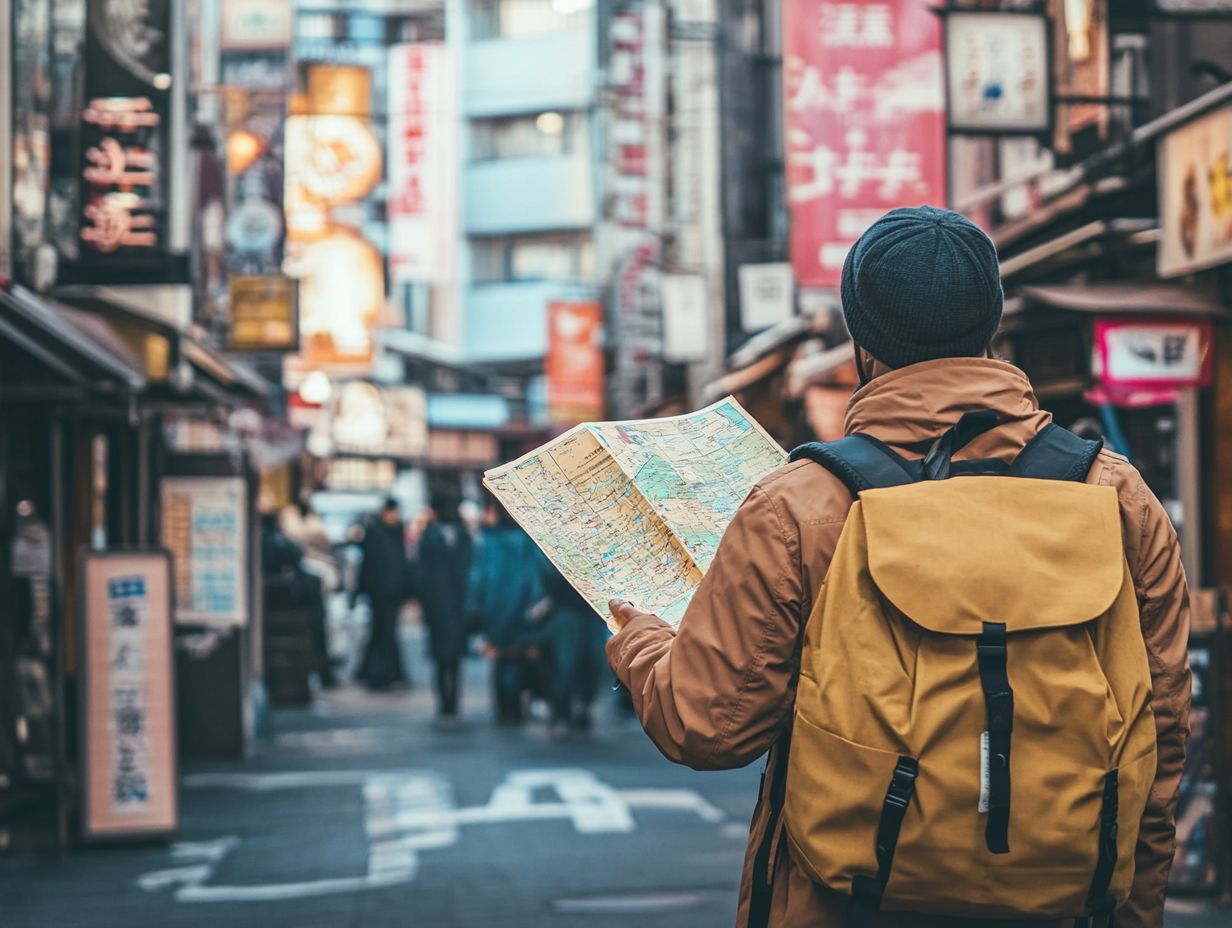
- Learn the local laws and customs to avoid trouble; always remember to stay informed about travel advisories.
- Practice responsible travel by considering the environment and being culturally sensitive while interacting with locals.
- Be aware of common local laws such as alcohol and drug laws, and respect dress codes and etiquette to avoid potential legal and social consequences.
Why Knowing Local Laws Matters
Familiarity with these regulations not only aids in planning safety measures but also enhances your travel experience through experiencing the local culture and mindful engagement with nature and wildlife.
In places like Hawai i, this awareness can profoundly enrich your journey, all while helping you minimize your environmental impact and carbon footprint. Participating in eco-friendly activities, like clean-ups, helps the environment.
Researching Before Your Trip
Researching before your trip is crucial for ensuring a safe and enjoyable travel experience, particularly when it comes to understanding local laws and customs and current travel advisories.
Delving into travel journals can offer you firsthand accounts of your destination, revealing invaluable insights into cultural nuances and hidden gems.
By tapping into online resources, such as travel blogs and forums, you can access up-to-date information and reviews that highlight unique experiences waiting for you.
Check government advisories for essential updates regarding safety and security issues that could impact your travel plans. Familiarizing yourself with local customs and environmental considerations allows you to engage more meaningfully with the communities you visit, fostering respect and understanding while elevating your overall adventure. For a deeper understanding of your impact, refer to responsible travel: a guide for conscious explorers.
Interacting with Locals
Interacting with locals during your travels presents a remarkable opportunity for cultural immersion, enabling you to learn about their customs while traveling responsibly.
By embracing this chance, you can deepen your understanding of diverse ways of life and cultivate meaningful connections. Engaging respectfully with local populations enriches your travel experience and fosters bridges between cultures.
It’s vital to approach these interactions with an open mind and a genuine desire to learn. For instance, joining community-led eco-friendly initiatives, such as beach clean-ups or wildlife conservation projects, offers a platform for collaboration and dialogue.
These activities benefit the environment and create a shared sense of purpose, reinforcing the importance of respecting the land and its people. By participating in such initiatives, you contribute to sustainable practices, ensuring that future generations can relish the beauty of diverse cultures and vibrant ecosystems.
Start exploring today your adventure awaits!
Responsible Travel Practices
Embracing responsible travel practices is crucial for minimizing your environmental footprint. This includes actions like carbon offsetting balancing your travel emissions by supporting eco-friendly projects and fostering travel that helps the local area.
By adopting these mindful habits, such as staying hydrated and nourished, you can ensure that your journeys leave a positive mark on the destinations you explore.
Environmental Considerations
When planning your adventures, think about the environmental impact of your travel choices. This includes minimizing your carbon footprint and protecting delicate ecosystems like coral reefs while supporting marine life.
Choose eco-friendly transportation options like public transit, biking, or walking. These choices significantly reduce your contribution to greenhouse gas emissions, which are gases that trap heat in the atmosphere and contribute to climate change.
Participating in community clean-up activities enhances the beauty of the area and instills a sense of collective responsibility among all involved. Support sustainable tourism initiatives to help local economies thrive while preserving the area’s natural beauty.
Staying informed about local environmental issues and regulations empowers you to make conscious decisions that protect the places you visit.
Cultural Sensitivity
Cultural sensitivity is essential for responsible travel. It allows you to engage meaningfully with local communities while honoring their customs and traditions.
When you learn about local practices, you often find yourself welcomed with open arms. For example, respecting dinner etiquette like waiting for the host to signal when it’s time to eat can transform a meal into a harmonious gathering.
Understanding the importance of local attire, such as wearing modest clothing in certain cultures, shows your awareness and appreciation for those traditions. By embracing culturally sensitive behaviors, you elevate your journey and foster positive interactions with locals.
Common Local Laws to Be Aware of
Being aware of common local laws can elevate your travel experience. Stay informed and be aware! By ensuring compliance with tourism regulations, you can avoid potential legal pitfalls and fully enjoy your adventures without unwelcome surprises.
Alcohol and Drug Laws
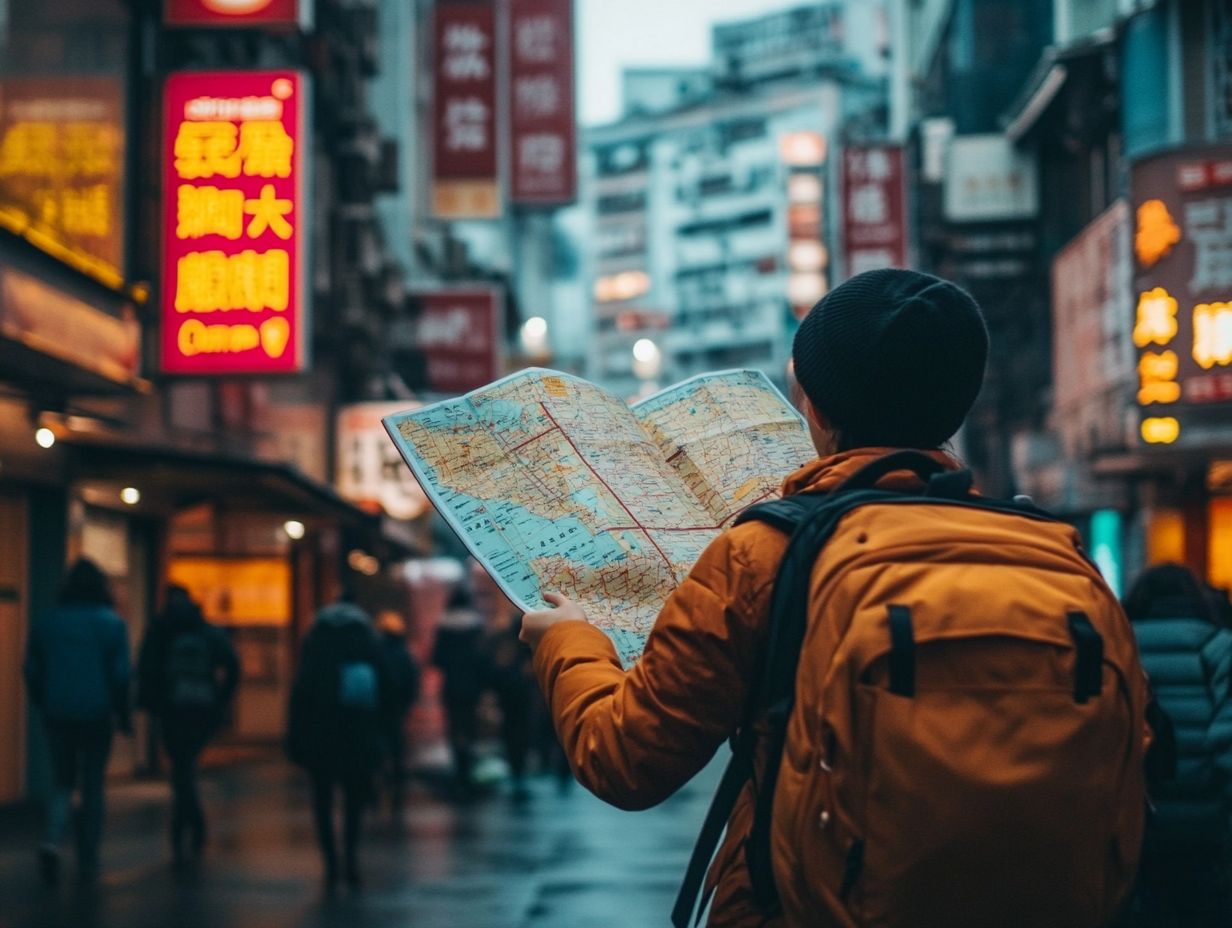
Know the local alcohol and drug laws. Understanding these can keep your trip enjoyable and safe. Alcohol and drug laws can vary dramatically, so it s essential to familiarize yourself with local regulations.
This knowledge helps you enjoy your trip without worries about serious penalties, which can range from hefty fines to imprisonment. For instance, in some countries, possessing even a small amount of certain substances can lead to immediate legal trouble.
Educating yourself about these laws before visiting new destinations is crucial. Knowing the rules helps you avoid potentially perilous run-ins with law enforcement.
Start planning your responsible trip today!
Dress Codes and Etiquette
Understanding dress codes and etiquette is crucial for interacting politely with local communities. It shows your awareness of their customs and enriches your travel experience in meaningful ways.
In many cultures, specific attire serves as a symbol of respect. For instance, when visiting religious sites in countries like Indonesia or India, wearing modest clothing covering shoulders and knees is customary.
In contrast, Western beach cultures may accept swimwear in public spaces. This illustrates the stark differences in expectations. It’s wise for travelers to research local customs before arriving.
By observing locals or visiting places where local culture is showcased, you can gain valuable insights into appropriate attire and behavior. Adopting a respectful demeanor, such as removing your shoes before entering homes or temples, can foster goodwill and create a deeper connection with the local community. Additionally, consider following responsible travel practices for solo travelers to enhance your experience and minimize your impact.
Consequences of Breaking Local Laws
Understanding the potential consequences of violating local laws is essential for ensuring a safe and enjoyable travel experience. Legal and social repercussions can profoundly affect your journey, influencing everything from your freedom to your overall enjoyment.
Stay informed about packing essentials and let this knowledge enhance your adventures.
Potential Legal and Social Consequences
The potential legal and social consequences of breaking local laws can range from fines and imprisonment to social ostracism, underscoring the need for you to adhere to regulations while traveling.
Consider this: if you re caught engaging in illegal street performances in a city known for its strict public decency laws, you could face hefty fines or even arrest. This not only tarnishes your personal reputation but may also invite community backlash, leading locals to view you with disdain.
If you ignore environmental regulations, such as littering in protected areas, you risk not just penalties but also becoming alienated from the social fabric of your destination.
Understanding and respecting local laws is crucial. Reflect on how your actions might ripple through the community, impacting not just your journey but also your social standing among the residents.
Frequently Asked Questions
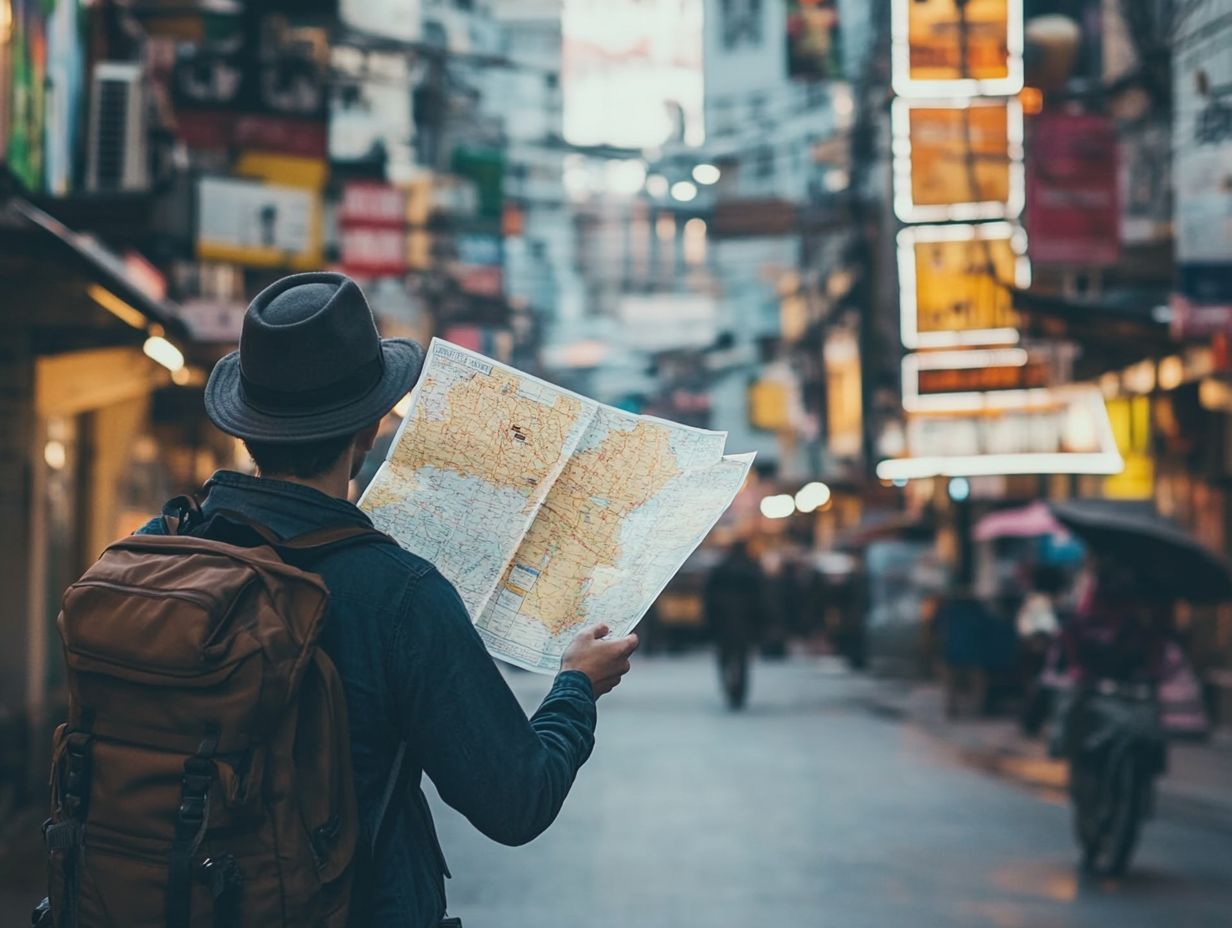
Navigating local laws for responsible travel means understanding and abiding by the laws and regulations of the destination you are traveling to in a responsible and ethical manner. It involves being aware of local customs, cultural sensitivities, and environmental concerns.
Navigating local laws for responsible travel is important because it allows travelers to have a positive impact on local communities and the environment. It also helps to ensure that travelers are not unknowingly breaking any laws or disrespecting the local culture.
What are some examples of local laws that travelers should be aware of?
Some examples of local laws that travelers should be aware of include rules regarding littering, wildlife protection, cultural and religious customs, and drug and alcohol consumption. It is important to research and familiarize yourself with the laws of your destination before traveling.
Travelers can navigate local laws responsibly by conducting thorough research about their destination, being respectful and mindful of local customs and traditions, and following all laws and regulations. It is also important to support local businesses and communities and to minimize the impact on the environment.
The consequences of not navigating local laws for responsible travel can range from fines and penalties to imprisonment or deportation, depending on the severity of the offense. Not respecting local laws and customs can also lead to negative impacts on the local community and environment.
How can travelers stay updated on any changes to local laws?
Stay informed about local laws by checking government websites regularly!
Don’t forget to consult a trusted travel agency that knows the area.
Keep an eye on local cultural events or holidays they could impact your trip!

